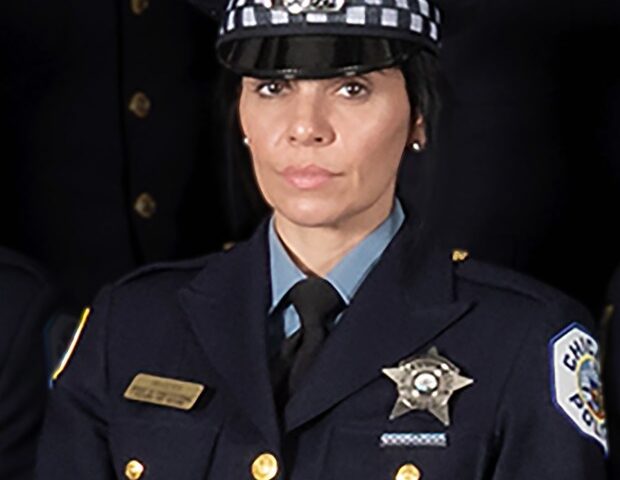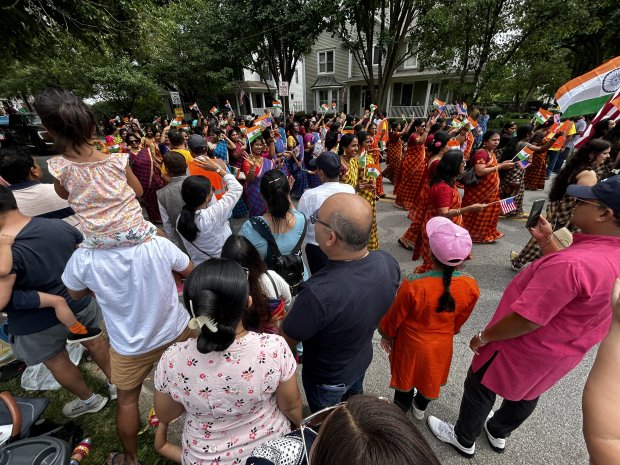Just off the lobby at the gated North Lawndale campus of the social service agency UCAN sits a room where women, mainly mothers, convene for hours sharing stories about their lives and children, their successes and frustrations. This is a safe space, one where the violence that touched these women’s lives isn’t the focal point.
Instead, some young moms try to juggle feeding a teething baby while sharing their hopes. Even though there are vulnerabilities, humor finds its way in to the conversations, and hugs are given freely.
The women build camaraderie through activities such as horseback riding, paint-and-sip events at the beach and outings to city museums. And while they are forging relationships at these sessions each weekday — with eight sessions a week, each lasting two to four hours — they are supported by a network of clinicians, therapists, faith advisers and therapists.
This is the SheRo Program, a new initiative of the social services agency UCAN Chicago. SheRo participants are at the highest risk of firearm violence and meet certain criteria, including active street involvement, justice system involvement, previous victimization and trauma associated with community violence, and exhibiting violent behavior.
The program aims to help women heal and in so doing, change the trajectory of their lives. As the women are coached to improve their physical and mental well-being in life skills workshops, the UCAN team provides support for their challenges and makes referrals to peer organizations that can also provide services when needed.
SheRo sessions are offered for 90 days. Participants then transition to individualized development plans for the next nine months with case managers who connect their goals, interests and needs with a workforce and educational pathway.
UCAN Chicago has served residents across the South and West sides for over 150 years, providing clinical and counseling services as well as transitional and independent living programs for at-risk youth. However, the SheRo program is female-focused, operating under UCAN’s Violence Intervention and Prevention Services program.
UCAN’s CEO, Christa Hamilton, said the uniqueness of the program lies in its holistic approach that centers participants’ mind, body and soul. Women on the West Side at a high risk of violence, as victim or perpetrator, comprise the cohort.
“We have licensed clinicians that sit in with them, either one on one or in groups, working on their mental health,” Hamilton said. “We have a spiritual leader come in to do some version of worship. Individually, she prays for them and they can reach out to her, text her, when they feel they need that level of spiritual support. They are able to unpack a lot of things they haven’t been able to unpack before. And then we have a nutritionist, physical wellness coach. She comes in and they work out, and go over recipes and talk about how to keep their bodies strong.”
Strength was apparent at a Feb. 5 SheRo group session. At least eight women from the North Lawndale area gathered for a group session titled “My Story, My Glory,” where the women shared why the program speaks to them and their plans for the future.
Marquisha Little came to UCAN following a very public shooting near a Popeye’s restaurant on the West Side in 2021, where she was hit three times and subsequently lost a kidney. “The stuff with gun violence, it’s traumatizing,” she said. “I don’t play with the guns. I’ve been through enough. I almost lost my life.”
Kionna Kemp, the mother of a 4-year-old, aspires to become an American Sign Language interpreter. Her teacher discovered her interest in languages and gave her an ASL book that she has studied, learning as much as she can on her own. She thinks ASL is something everyone should know. She’s still looking for a resource to help her progress in her education.
She came to UCAN after her involvement with the justice system. When she was in the restorative justice court at UCAN, the SheRo Program was recommended. She said no at first, not wanting to do anything beyond her community service. But since she joined the cohort a year ago, she’s made friends. Thinking back, she smiles, saying joining was a good idea.
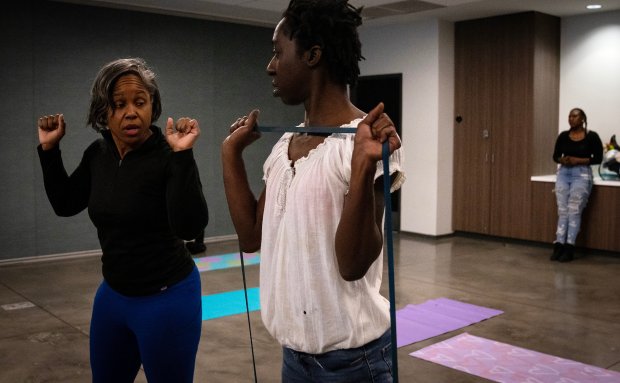
Ariel Townsend, 29, is awaiting the birth of twins, a boy and a girl, due April 10. She wants to make sure her kids are happy and healthy. She said she likes to help people and wants to work with kids in some way as a profession.
Kayla Medina, 21, has been a participant in UCAN’s programming since she was 15. She smiles when thinking about the exercises she’s done through SheRo. Medina said stretching exercises have helped her knees.
“They’ve been helping me for many years,” she said. She likes that the SheRoes program is in-person. Seeing everybody, and understanding that the women in the cohort have more in common than not, she is hoping UCAN will help her reach her goal of becoming a licensed practical nurse.
“UCAN is helping me with my patience, get my mind together, get my goals,” she said. Medina said that SheRo is helping the community. “Men have a lot of groups out here; they have every chance to turn their life around through these groups and now the women do too.”
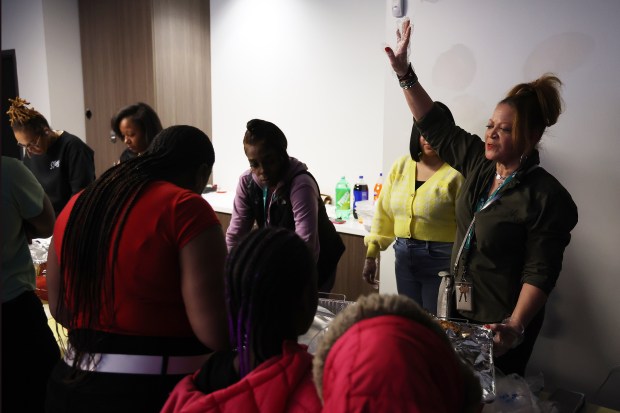
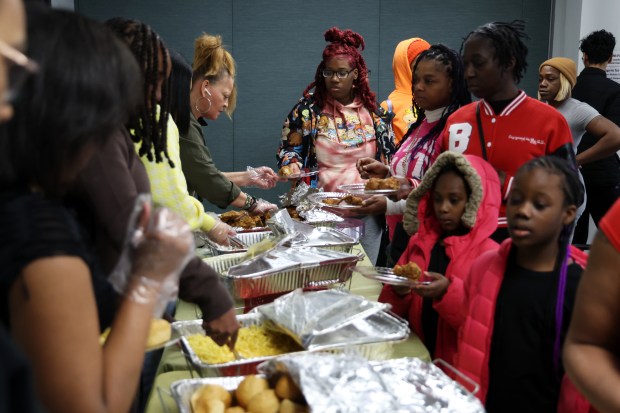
As the first woman and first Black CEO of UCAN, Hamilton said it was important to her to create something specific for women. With more women involved in gun violence in Chicago, that can leave children who are already living in single-parent households in an even more precarious position, she said.
“It was critically important for me to ensure that I’m putting women’s needs in the forefront,” she said. “These are heroes. These women, even when they are not a victim, when a male is shot or killed, most times we are rarely taking men to the funeral homes with us to pick out a casket, or to set up funeral arrangements. It’s some woman in the family who has to carry the load, to put things back together. If the father was the breadwinner, now the mom has to step into that position.”
Hamilton said SheRo was born out of consideration for all of that financial, mental, spiritual and emotional stress.
Hamilton is trying to create an ecosystem of support with SheRo’s addition to UCAN programming. She’s set her sights on broadening the program to the Far South Side, so more women and mothers can learn how to deal with grief, manage traumas, and be better for themselves and their community. Hamilton said participants enter SheRo through UCAN’s partners, a community driven referral process, as well as word-of-mouth.
Beverly Henry, youth development coach with UCAN, said she’s assisting women in the program because her community has so many deaths. She’s been working with people in her community for over 20 years. “If I ain’t trying to help them do nothing, I’m going to have to help bury them,” she said. “If these programs will help them do a little bit better, that’s what I’m for.”
Shartesia Noble embraces the program. Born and raised in North Lawndale, she lost a niece and brother to gun violence. Noble herself has been stabbed twice. The mother of two men, ages 24 and 20, Noble said she’s not sure if violence will ever cease or decrease, but she hopes a “teach one, reach one” philosophy will spread throughout the larger community with UCAN programming that “encourages, empowers, inspires and uplifts women.”
“The SheRo Program equips women of all ages, races and backgrounds with the skills and knowledge to be able to go from victim to victor, from damaged to dynamic, from tragedy to triumph, from insecure to comforted, from despair to rejoicing,” Noble said.
She thanked UCAN staff members for their selflessness, compassion, empathy, kindness and humanity in helping her and others on their transformational journey. “The SheRo Program instills hope in women to keep them optimistic about their future … deals with the whole woman … and is what the North Lawndale community needed,” she said.
Paviella Foster, UCAN’s senior vice president for prevention and empowerment services, encouraged the women to keep giving voice to what they are going through because it may save or help somebody else on their journey.
“Hearing from all of the women here expressing more needed women’s groups, and to be able to support and empower them is extremely important,” she said. “Having it on the West Side, expanding to the South Side, is important because women need to know that they have a voice in a space where they’re not judged or penalized for expressing how they feel. My hope is that we continue to expand, have larger groups.”



